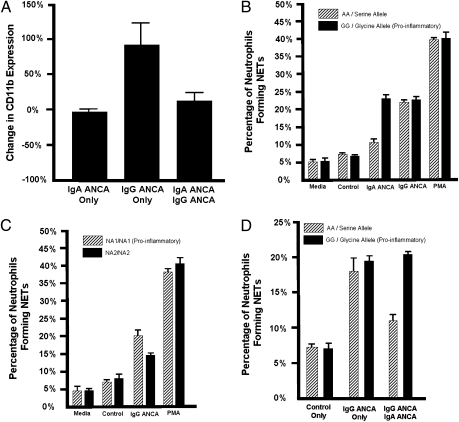Fig. 1.
IgA ANCA, IgG ANCA, and their Fc receptors influence neutrophil activity. (A) Human IgG and IgA anti-PR3 containing antibody fractions impact degranulation in neutrophils from healthy donors (n = 4) measured as change in CD11b surface expression by flow cytometry. These differences in degranulation were compared with stimulation with IgG and IgA antibody fractions not containing anti-PR3. (B) When stratifying by FCAR genotype (rs16986050), the homozygous G allele, which results in a proinflammatory response, was associated with a higher percentage of cells with NET formation when stimulated with IgA anti-PR3 antibody fractions (P = 0.008). Stimulating with media or antibody fractions from healthy controls was used as a negative control. Phorbol myrisitate acetate (PMA) was used as a positive control. (C) When stratifying by FCGR3B NA1/NA2 genotype, the more proinflammatory NA1 genotype results in a higher percentage of cells with NET formation when stimulated by IgG anti-PR3 antibodies (P = 0.003). (D) Stimulating with IgA anti-PR3 antibody fractions can reduce the NET formation potential of IgG ANCA stimulation in a genetically dependent manner. Stimuli included antibody fractions from healthy controls, antibody fractions from IgG anti-PR3–positive patients, and a combination of antibody fractions from an IgG anti-PR3–positive patient and an IgA anti-PR3–positive patient. The presence of the A allele of rs16986050 in FCAR significantly reduced the potential of IgG anti-PR3 antibodies to induce NET formation when costimulated with IgA anti-PR3 antibodies (P = 0.0001).

